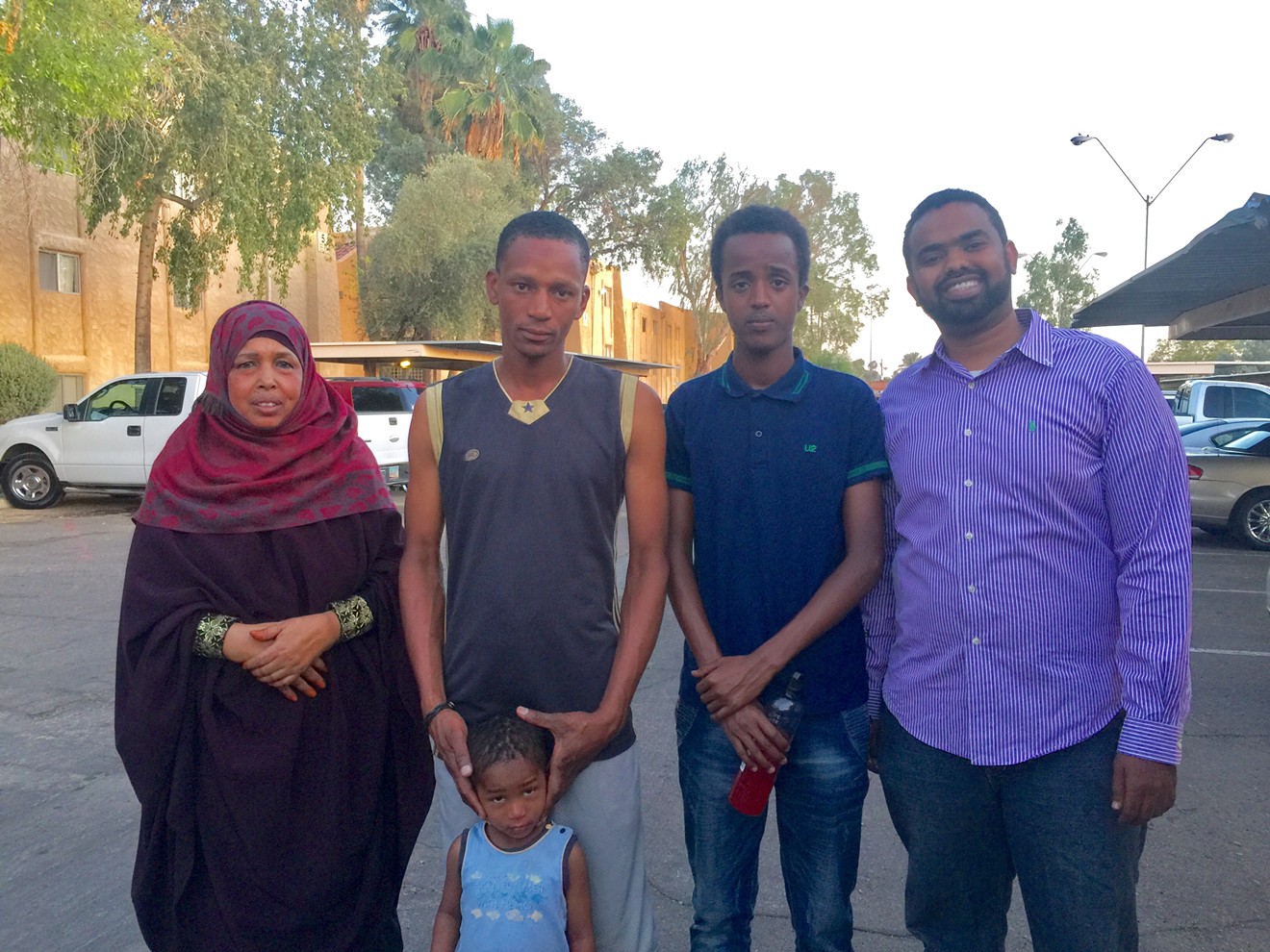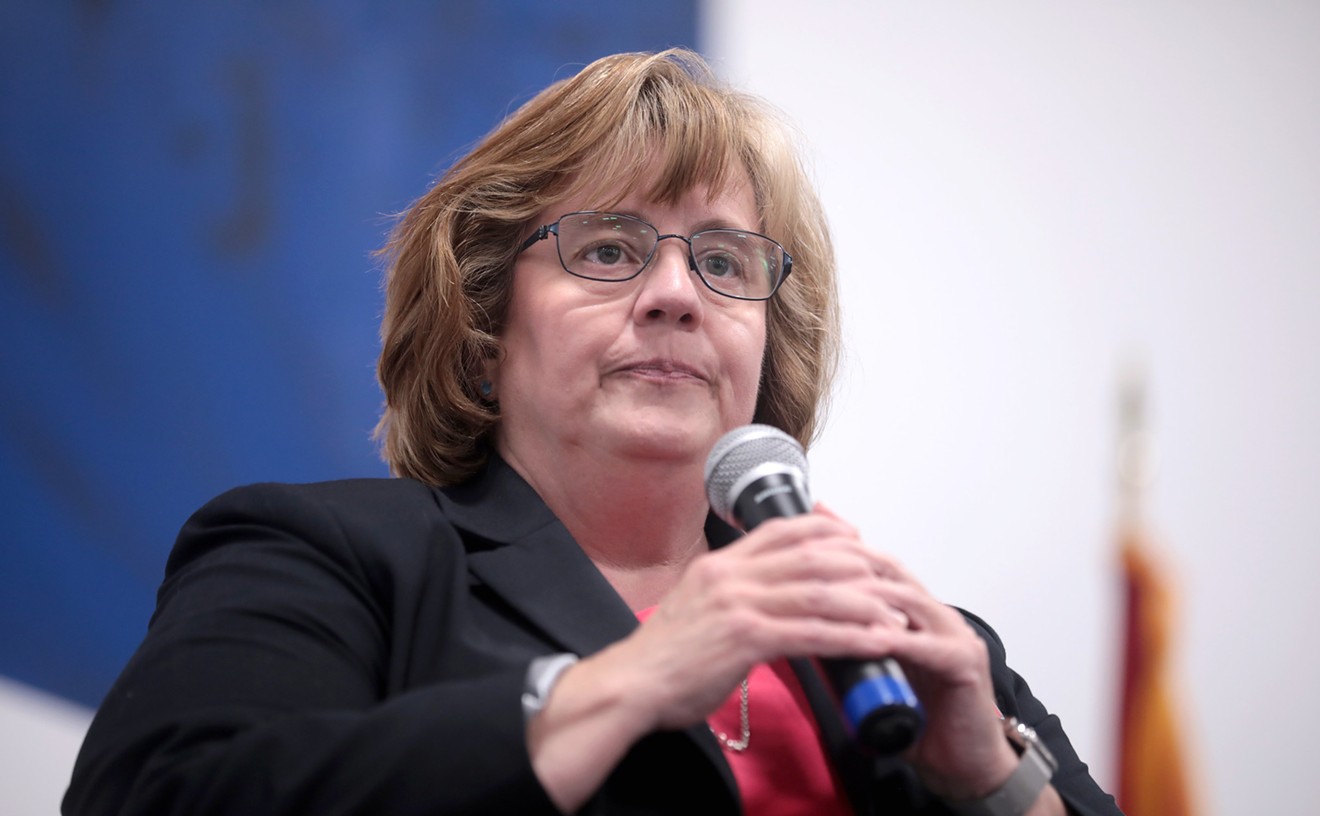A few small backpacks, holding clothing that had traveled all the way from a refugee camp in Ethiopia, were stuffed in back of the gold Toyota 4Runner that would carry them to the airport.
The keys had already been dropped off at the leasing office for La Mirada, a modest beige stucco apartment complex located on Northern Avenue in Sunnyslope.
Bilad Yusuf and her seven kids were on their way to Minnesota, less than two months after they arrived in Phoenix.
"We didn't know how to get jobs here, and even if we did, we didn't know how we'd get to them," she explained through an interpreter who translated from Somali to English.
After waiting for six years in a refugee camp, Yusuf and her family arrived in the United States this winter amidst the chaos surrounding the Trump administration's attempt to block Somali immigrants like them from entering the country.
Following a brief stop in Houston, they were transferred to Phoenix. There, stranded in the urban sprawl without a car, they found themselves lost: Where were they supposed to get groceries? How did they go about setting up long-overdue doctor's appointments? How would they pay rent after their initial stipend from the U.S. government ran out?
The Somali Association of Arizona stepped in, providing groceries and setting up doctor's appointments for the refugees. But they couldn't do anything about the fact that the fact that with limited English and no training, Yusuf and her older children weren't qualified for many jobs.
So, worried that her rent would be cut off soon, Yusuf ultimately decided they should move to Minnesota, where she, like virtually all Somalis, has family.
The hope is that there will be more job opportunities there, as well as a larger support network. But Yusuf says she'd like to return to Phoenix one day.
'If opportunity calls in Arizona, I'm coming," she said in Somali.
Mukhtar Sheikh, the program coordinator for the Somali Association of Arizona, says that Yusuf's story is a common one.
Between 1981 and 2017, Arizona took in 7,351 Somali refugees, according to Department of Economic Security statistics. But how many of those refugees actually stay in the state is another question.
Sheikh estimates that as many as half the Somali refugees resettled in Arizona end up leaving — typically for Minnesota, or other parts of the country where there's a large Somali community — because they're unable to find jobs here.
"I think Arizona is able to do more for refugees, to be honest," he says. "If Arizona invested in these families, it would actually benefit the state, because they're really hardworking."
Contrary to popular belief, refugees who are resettled in Arizona receive relatively little financial assistance from the state. In fact, their main source of cash assistance is the federal government.
Like all refugees arriving in the country, every individual who's resettled in Arizona receives a one-time payment of $925 from the U.S. Department of Health and Human Services. That typically covers their rent in Phoenix for three months, Sheikh says. Larger families receive more money, since the payments are per-person, and sometimes are able to stretch it out to last for six months.
"If that money runs out and they don’t have a job, then there starts to be pressure for them to find a way to survive," Sheikh says. "There's not a lot of programs to help them with employment here."
Meanwhile, assistance from the state is restricted to what Sheikh describes as "limited medical services" and food stamps.
"The one thing that Arizona does very well is making sure that at least these families will not go hungry," he says. "But sometimes these families don’t get enough help — they come in saying, "Oh, my food stamps have stopped,' so we have to call DES and ask them why."
Refugees have to complete a monthly report proving that they are taking English classes and looking for jobs in order to keep receiving food stamps. But language and literacy barriers often get in the way.
Sometimes, Sheikh says, refugees will receive a letter from DES letting them know that they need to take specific steps in order to keep on receiving their food stamps. But because they aren't able to read the letter, they aren't able to act on it.
Caseworkers for the nonprofit agencies that work to resettle new refugees are often overwhelmed, he adds. "They're limited in the amount of aid that they can provide."
But the biggest challenge is finding a job, he says. When he first arrived in Phoenix, he was able to find a job at Sky Harbor International Airport and work his way through ASU. Other Somalis have followed a similar path and found jobs at the airport. But many others have found that even jobs cleaning hotel rooms or washing dishes in a restaurant come with a requirement that applicants speak English — or, unofficially, Spanish.
That means that the refugees who were already relatively well-off back in Somalia and had the opportunity to study English there end up having an easier time getting hired in the United States.
"The people that struggle the most are people who have no educational background," Sheikh says. "They're the people most in need, and they face the biggest hardships when coming here and trying to find opportunities here."
Recently, he's gotten calls from recruiters working on behalf of Amazon warehouses in Minnesota and Kentucky, looking to hire managers who speak Somali in addition to English.
That tells him that they're hiring a lot of Somali refugees who don't speak English yet, he says. He'd like to see the same thing happen in Arizona, where, to his knowledge, only a handful of refugees have been able to get jobs at Amazon distribution centers.
But, he acknowledges, "There's only only so much that one company can do. There has to be support from the state."
For one thing, he believes that refugees need more time to adjust before the government cuts them off entirely. Three to six months — the amount of time that refugees typically have before their cash assistance runs out — is not long enough for them to adapt to a new country and learn to speak English. And it doesn't help that many have escaped civil war and famine to get here, and are deeply traumatized or simply tired.
After those three to six months are up, Sheikh says, refugee families end up getting evicted because they're not able to make rent. The Somali Association of Arizona tries its best to help them out, with support from the local Muslim community.
"So far we haven’t had any refugees become homeless, that I know of," he says. "Most of the time, they say they have family in Minnesota, they can find jobs in Minnesota, so we fundraise to help them get a ticket to go there."
Ohio, Texas, Nebraska, and other states where Somali immigrants have been able to find jobs at factories are also common destinations, he says.
The Department of Economic Security, which administers the Arizona Refugee Resettlement program, doesn't track where refugees end up once they stop receiving services from the state, director of communications Tasya Peterson says.
So it's impossible to get an exact count of how many refugees have left for other states in search of better opportunities.
But, Peterson adds: "We do know that Somali refugees resettled in many states have relocated to live in cities in which the largest numbers of Somalis reside, including cities in Minnesota and Ohio, due to mutual assistance and other affinity relationships."
It's not unusual or surprising that new immigrants would end up in places where they can take advantage of established community networks.
But it is unfortunate that Arizona hasn't been able to support that kind of community.
Elsewhere in the country, Somali immigrants have revitalized small towns and dying main streets, finding jobs in meat processing plants and opening up their own small businesses. In Minnesota, which has the country's largest share of Somali immigrants, a recent study found that African immigrants have a collective statewide income of $1.6 billion and account for $800 million of buying power in the Twin Cities alone.
So how did Minnesota become a hub for Somali refugees?
Most credit the strength of the state's "voluntary agencies" — groups like Lutheran Social Services and Catholic Charities, both of which are also actively involved in resettling refugees in Arizona. Those nonprofit, nongovernmental groups welcomed the first wave of Somali refugees to Minnesota in the early 1990s, and others soon followed.
When the U.S. State Department decides where new refugees should end up, the presence of voluntary agencies that will help them learn English and find housing is key. (If a refugee has friends and family in one particular part of the country, that can also be a factor. However, as Bilad Yusuf's story shows, having relatives in one state is no guarantee that you'll end up there, too.)
But continued growth of Minnesota's Somali community also is a function of the ability of newly arrived immigrants to find jobs there.
"A lot of Somalis brought here to America due to the civil war of 1991 moved to Minnesota from other states for jobs," Ifrah Jimale writes in the Twin Cities Daily Planet. "Almost every Somali in Minnesota who came here between 1991 and 1998 worked at the chicken factories in Faribault and Marshall."
Sheikh says that many Somali refugees who arrive in Arizona want to stay here, if they can find a way to do so.
"Our culture is based on a work ethic," he says. "They don’t want to be on food stamps forever, they don’t want to be on government assistance forever. All they need is the opportunity to provide for their families."
[
{
"name": "Air - MediumRectangle - Inline Content - Mobile Display Size",
"component": "18478561",
"insertPoint": "2",
"requiredCountToDisplay": "2"
},{
"name": "Editor Picks",
"component": "16759093",
"insertPoint": "4",
"requiredCountToDisplay": "1"
},{
"name": "Inline Links",
"component": "17980324",
"insertPoint": "8th",
"startingPoint": 8,
"requiredCountToDisplay": "7",
"maxInsertions": 25
},{
"name": "Air - MediumRectangle - Combo - Inline Content",
"component": "16759092",
"insertPoint": "8th",
"startingPoint": 8,
"requiredCountToDisplay": "7",
"maxInsertions": 25
},{
"name": "Inline Links",
"component": "17980324",
"insertPoint": "8th",
"startingPoint": 12,
"requiredCountToDisplay": "11",
"maxInsertions": 24
},{
"name": "Air - Leaderboard Tower - Combo - Inline Content",
"component": "16759094",
"insertPoint": "8th",
"startingPoint": 12,
"requiredCountToDisplay": "11",
"maxInsertions": 24
}
]












